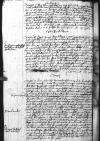List #4063
Ioannes DANTISCUS do Nikolaus FRIEDWALDHeilsberg (Lidzbark Warmiński), 1545-06-17
Rękopiśmienne podstawy źródłowe:
| ||||
Tekst + aparat krytyczny + komentarzZwykły tekstTekst + komentarzTekst + aparat krytyczny
Unsernn etc.
Bey dem negstnn botnn sein disse brive zu den unsernn beyzulegen noch geblibnn, / die wir hiemit noch schicken. Wir habnn ouch we... in Ewer Herlichkeit sache mit des hern
Datum aus unserm schlosse
